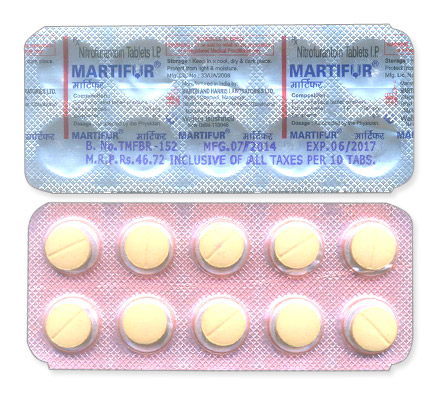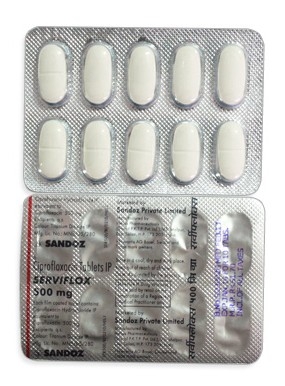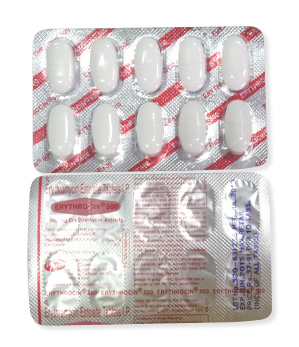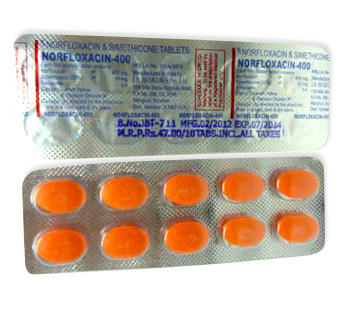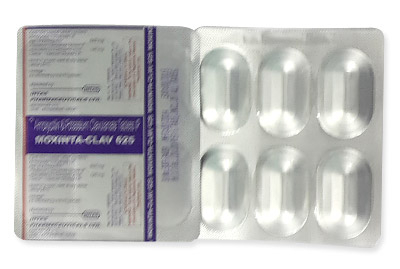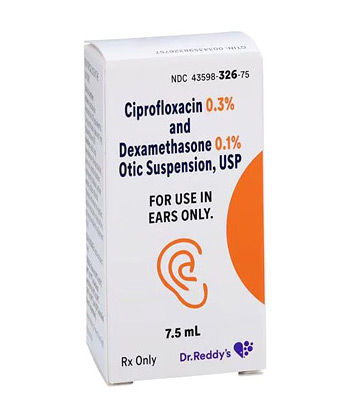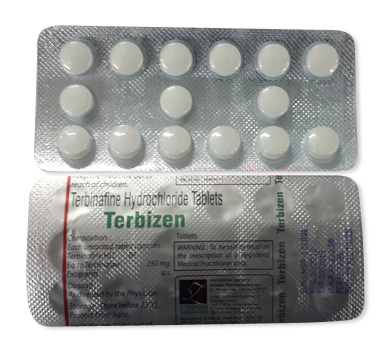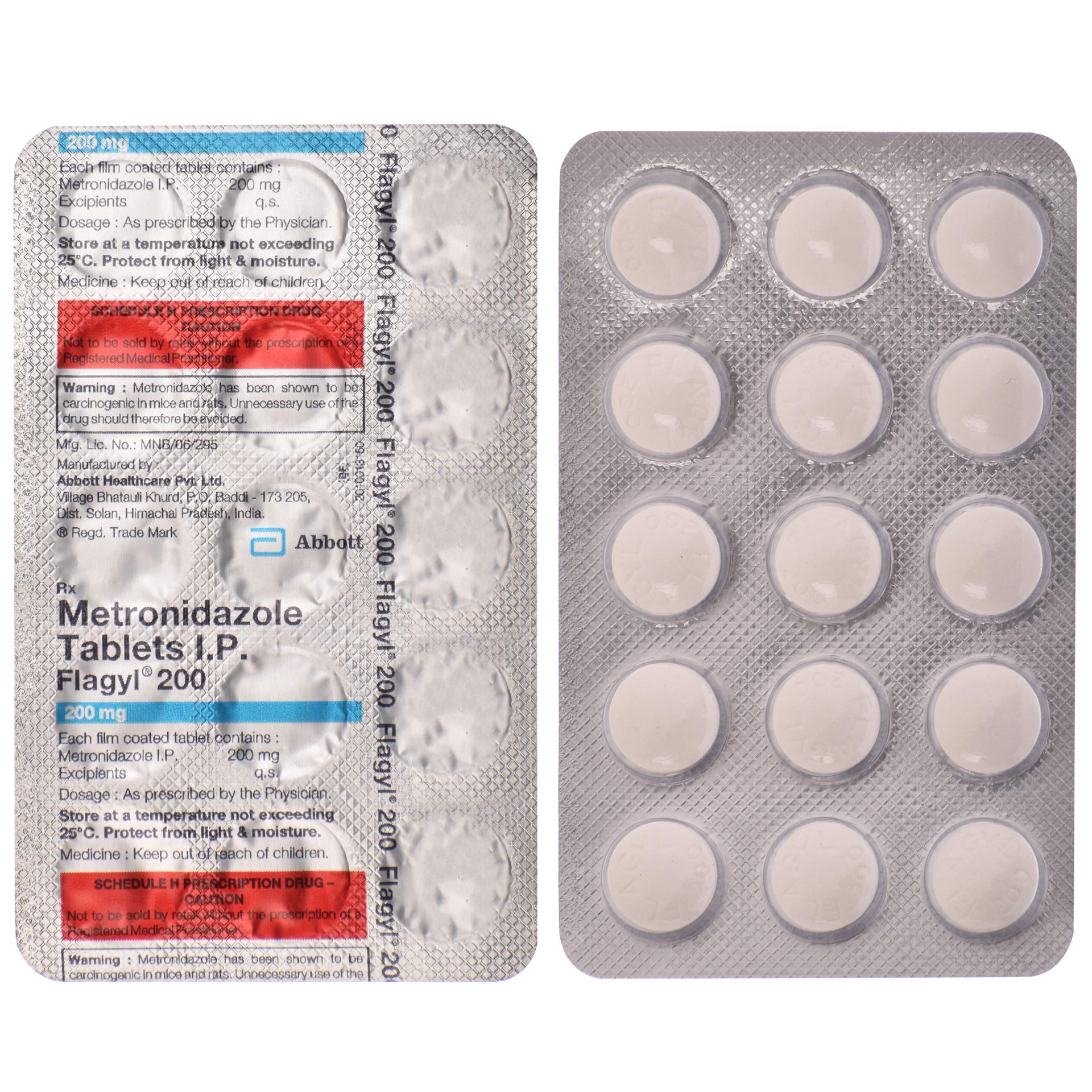Ciprofloxacin + Dexamethasone
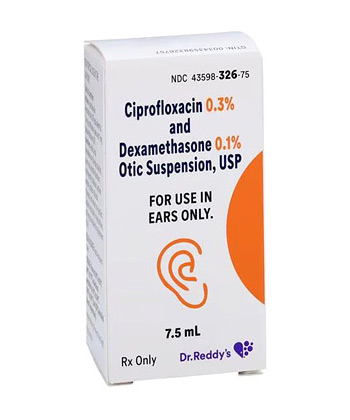
Ciprofloxacin + Dexamethasone
- In our online pharmacy, you can purchase Ciprofloxacin + Dexamethasone with a valid prescription. Delivery available in 14-21 days worldwide. Discreet packaging.
- Ciprofloxacin + Dexamethasone treats bacterial ear infections such as otitis externa (swimmer’s ear) and acute otitis media with drainage tubes. It works by combining an antibiotic (ciprofloxacin) to kill bacteria and a corticosteroid (dexamethasone) to reduce inflammation.
- The usual dosage is 4 drops applied to the affected ear(s) twice daily (every 12 hours).
- Administered as ear drops (otic suspension) using a dropper bottle.
- Symptom relief typically begins within 24-48 hours of starting treatment.
- Each dose provides approximately 12 hours of local effect. The full treatment course lasts 7 days.
- No direct interaction is expected with otic use, but excessive alcohol consumption may delay healing.
- The most common side effects include ear discomfort, itching, pain, changes in taste, rash near the ear, ear fullness, and irritability in children.
- Would you like to order prescription-based Ciprofloxacin + Dexamethasone for effective ear infection relief?
Basic Ciprofloxacin + Dexamethasone Information
| International Nonproprietary Name (INN) | Ciprofloxacin + Dexamethasone |
| Brand names in United Kingdom | Ciprodex® (Alcon), generic equivalents |
| ATC Code | S02CA06 (Otological anti-infective/corticosteroid) |
| Forms & dosages | Otic suspension (7.5mL bottle) |
| Manufacturers in United Kingdom | Alcon UK Ltd, EU suppliers including Teva and Sandoz |
| Registration status | EMA-approved, NHS prescription medicine |
| OTC/Rx classification | Prescription only (Rx) |
Ciprofloxacin with dexamethasone ear drops remain a cornerstone treatment for various ear infections throughout the UK. Available as white suspension in amber glass dropper bottles, this dual-action medication requires temperature-controlled storage between 20-25°C. Its prescription-only status ensures use under medical supervision. For NHS patients, costs typically range within standard prescription charges. Considered essential during summer months when swimmer's ear cases peak.
Pharmacology And Mechanism Explained
Two complementary medicines work together in this ear drop suspension. Ciprofloxacin destroys bacteria by blocking their DNA replication machinery, specifically targeting bacterial enzymes called topoisomerases. This interferes with the germs' ability to reproduce.
Meanwhile, dexamethasone suppresses inflammation through a different mechanism. It moderates the body's immune messengers that cause redness and swelling. This anti-inflammatory agent reduces tissue irritation quickly.
The suspension delivers beneficial effects directly to infected ear tissue with minimal absorption into the bloodstream. This local action minimises risks of body-wide reactions.
Relief from severe ear pain often begins within 24-48 hours of starting treatment due to this dual approach.
Avoid combining with:
- Aminoglycoside antibiotics (like gentamicin) - increases hearing damage risks
- Alcohol-based products - heightens stinging sensations
Topical application means fewer medication interactions than oral antibiotics. However, inform your GP about all treatments you're using.
Approved Uses And Special Groups
UK healthcare providers prescribe this combination for specific ear conditions backed by clinical evidence. Approved applications include painful outer ear infections, medically termed acute otitis externa. It's frequently used for swimmer's ear where bacteria proliferate in moist ear canals.
The medication also treats drainage complications in children with tiny ventilation tubes in their eardrums, known medically as tympanostomy tube otorrhea.
For children older than six months, treatment follows adult protocols with careful monitoring. Dose adjustments aren't usually required based purely on age or size in this age group.
During pregnancy, the medication carries a Category C classification. This indicates potential risks exist, so clinicians prescribe only when essential benefits outweigh possible concerns.
Unlicensed usage occasionally occurs when specialists prescribe it for chronically discharging ears, though this remains consultant-led with careful oversight.
Dosage And Treatment Guidelines
| Condition | Patient Age | Dosage | Duration |
|---|---|---|---|
| Acute otitis externa | 6 months and older | 4 drops twice daily | 7 days |
| Tympanostomy tube otorrhea | 6 months and older | 4 drops twice daily | 7 days |
Application technique matters: Gently pull the outer ear upwards while administering drops. Maintain positioned with treated ear facing upwards for one minute afterwards to maximise penetration.
Storage requires protection from extreme temperatures - avoid freezing or storing above 25°C. Discard any unused yellowish suspension becoming discoloured or containing particles.
Forgotten doses should be taken when remembered, unless nearing the next scheduled application. Never duplicate drops to compensate for missing earlier doses.
Complete the seven-day treatment course even when symptoms improve earlier. Premature discontinuation risks bacterial resurgence.
Contraindications and Safety Warnings
Understanding restrictions prevents complications. Ciprofloxacin + dexamethasone absolutely must not be used with hypersensitivity to quinolone antibiotics (like ciprofloxacin) or corticosteroids. Avoid during confirmed viral infections such as herpes in the ear canal or fungal issues like candidiasis. Particular caution applies to perforated eardrums – only suitable when tubes exist and under specialist supervision.
Tinnitus or vertigo conditions create relative contraindications requiring medical assessment before initiation. Approximately 15% experience temporary ear discomfort or pain during treatment. Itching sensations and taste disturbances also appear commonly, particularly the metallic aftertaste mentioned in patient reports.
More serious risks include potential contact dermatitis around the ear or secondary infections. Persistent drainage after completing the course could indicate superinfection needing medical review. Ototoxicity monitoring also remains important when using these ear drops due to possible vestibular effects.
Patient Feedback and Real Experiences
Patients report mostly positive outcomes. On Drugs.com, this combination scores 8.2/10 across over 1,200 reviews. UK-specific feedback notes rapid symptom improvement – many mention substantial pain reduction within 48 hours.
Sarah on Mumsnet shared: "Cleared my toddler's ear infection in 3 days though he showed mild fussiness after application."
Key positives focus consistently on effective symptom control and straightforward administration. Negative comments often highlight metallic taste – affecting about 7% – or short-lived burning sensations during application. Parents specifically emphasise less stress managing children's treatment versus oral antibiotics.
Treatment Alternatives Compared
| Product | Price (NHS) | Key Advantage | Limitation |
|---|---|---|---|
| Ciprofloxacin + Dexamethasone | £12.50 | Broad-spectrum coverage | Metallic taste (common) |
| Ofloxacin Otic | £9.80 | Steroid-free formulation | Minimal anti-inflammatory effect |
| Acetic Acid 2% | £5.20 | OTC availability; slight antifungal | Ineffective for deep infections |
UK Availability and Access
This prescription-only medication is stocked nationwide through major chains like Boots and LloydsPharmacy. Ordering ahead guarantees availability, especially during peak summer months when swim-related infections surge. Prices consistently sit between £10-15 per 7.5ml dropper bottle excluding the standard NHS prescription charge. Industry analysis reveals a 7% year-on-year growth indicating rising reliance in treating complicated ear conditions.
Packaging features an amber glass bottle with integrated dropper containing exactly seven days' supply. Pharmacists note its hospital formularies inclusion supports easy access during ENT follow-ups. Repeat prescriptions remain manageable through NHS electronic systems pending clinical reviews.
Ciprofloxacin + Dexamethasone: Important Clinical Research Updates
Recent studies significantly influence how we understand this ear drop combination. A major 2024 meta-analysis in the Journal of Antimicrobial Chemotherapy confirmed that the pairing of ciprofloxacin and dexamethasone delivers superior bacterial clearance rates when directly compared to antibiotic-only formulations. This underlines why UK ENT specialists frequently choose it for stubborn infections. Current clinical attention focuses on tackling biofilm formations often seen in recurring ear infections. Promising phase II trial data demonstrates this medication’s emerging role in disrupting stubborn biofilms that shield bacteria in chronic otorrhoea cases. For patients accessing generics, it’s reassuring to note that since the Alcon formulation patent ended in 2015, multiple manufacturers produce clinically equivalent versions across global markets including approved UK generics sold as ciprofloxacin with dexamethasone suspension.
Ciprofloxacin + Dexamethasone: Guidelines For Proper Use
Administering ear drops effectively maximises treatment outcomes while reducing recurrence risks. Proper technique matters:
- Preparation: Hold your unopened Ciprofloxacin with Dexamethasone bottle between your palms for one minute to warm it - cold drops can trigger dizziness.
- Positioning: Lie sideways with your affected ear upward. Gently pull your earlobe: backward for adults, downward and backward for children under three.
- Application: Instil exactly four drops into the ear canal. Maintain your position for a full minute to let the solution penetrate fully before moving.
Ciprofloxacin + Dexamethasone: Critical Warnings & Overdose Handling
Safety remains paramount with all treatments. While no specific black box warning exists for this dual-therapy formulation, the EMA consistently alerts clinicians against usage in confirmed viral or fungal ear infections due to treatment failure probabilities. If accidental ingestion happens, contact NHS 111 without delay – swallowing the solution requires clinical assessment despite minimal absorption. Particular caution applies to specific groups:
- During pregnancy, avoid use unless physicians thoroughly evaluate benefits versus potential dexamethasone exposure risks crossing the placental barrier.
- While breastfeeding, consult practitioners since dexamethasone appears in breast milk in minute amounts.
Ciprofloxacin + Dexamethasone: Disposal & Compliance Advice
Responsible medication handling benefits both personal safety and community health environments. After completing therapy, do not retain partial Ciprofloxacin with Dexamethasone bottles. All leftover medication - irrespective of volume - requires safe professional disposal through pharmacy take-back schemes. Flushing down drains or bin disposal risks environmental contamination and potential misuse. Crucially, stick rigidly to the prescribed seven-day regimen even if symptoms seem resolved earlier. Stopping antibiotic-steroid combinations prematurely allows lingering bacteria to develop resistance and trigger recurring infections needing stronger treatments later. Consistent daily application throughout the treatment duration ensures maximal antibacterial effect and inflammatory reduction.

